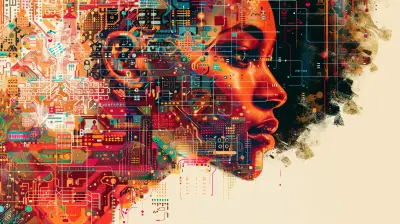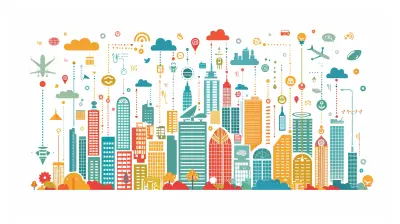Navigating the Moral Maze of AI Decision-Making
21 June 2025
Artificial Intelligence (AI) is a term that, in recent years, has become synonymous with innovation, progress, and even a little bit of fear. We’ve all heard about the marvels of AI—from self-driving cars to virtual assistants like Siri and Alexa—but what about the moral dilemmas that come along with these advancements? That’s where things get tricky.
Let’s face it—AI is becoming more involved in our everyday lives than we ever anticipated. It’s making decisions that were once exclusively in the hands of humans. But here’s the catch: AI doesn’t have a moral compass. It doesn’t understand empathy, fairness, or justice in the way we do. So, who should decide how AI makes decisions? And more importantly, how do we navigate the moral maze that comes with it?

The Rise of AI in Decision-Making
Before we dive into the ethical swamp, let’s take a moment to appreciate how AI is infiltrating decision-making processes. From healthcare to finance, AI is stepping up to the plate in ways that were once unimaginable. It can analyze massive datasets, predict outcomes, and even offer suggestions faster than any human ever could. For example, AI algorithms are now helping doctors diagnose diseases more accurately, and banks are using AI to detect fraudulent transactions.But while AI can process data with lightning speed and precision, it does so without any understanding of the human context. If a self-driving car faces a situation where it has to choose between hitting a pedestrian or swerving into a wall, how does it make that decision? Should it prioritize the safety of the driver or the pedestrian? These are questions that aren’t just technical but deeply ethical.

The Problem with AI's "Black Box"
One of the biggest challenges in AI decision-making is the so-called "black box" problem. Imagine you’re baking a cake, but instead of following a recipe, you throw a bunch of ingredients into a machine, press a button, and out comes a perfectly baked cake. You have no idea how the machine mixed the ingredients or what decisions it made during the process. That’s essentially how many AI systems function today.AI algorithms, particularly those based on deep learning, are incredibly complex. Even the developers who create these systems can’t always explain how the AI arrived at a particular decision. This lack of transparency makes it difficult to trust AI entirely—especially when it’s making decisions that could have life-or-death consequences.
But here’s the kicker: it’s not just about understanding how AI makes decisions; it’s about whether those decisions are fair, just, and ethical. And that brings us to the next big question.

Who Programs AI's Morals?
Let’s get real for a second. AI doesn’t inherently understand what’s right or wrong. It only knows what it’s been taught. And that means the people who design AI systems are the ones programming its "moral compass." But are these developers equipped to make ethical decisions for society at large? Are they the ones who should be deciding the values that AI upholds?Consider this: different cultures have different moral values. What might be considered ethical in one part of the world could be seen as highly unethical in another. How do we account for these differences when programming AI? Should there be a universal moral code for AI, or should it be adaptable based on cultural context?
These are not easy questions to answer, and that’s part of the moral maze we’re navigating. The people behind the code have a huge responsibility, and the decisions they make today could have long-lasting impacts on society.

The Ethical Dilemmas: Bias and Fairness
One of the most talked-about moral challenges in AI decision-making is bias. You might think that machines are impartial—they don’t have feelings, so they can’t be biased, right? Wrong. AI systems are trained on data, and if that data is biased, the AI will be too.For example, facial recognition systems have been shown to be less accurate at identifying people with darker skin tones. This isn’t because the AI has some inherent bias against certain ethnicities—it’s because the data used to train these systems was predominantly made up of lighter-skinned individuals. The result? AI makes biased decisions based on incomplete or skewed information.
But bias doesn’t just exist in facial recognition technology. It can pop up in hiring algorithms, loan approval processes, and even criminal justice systems. If an AI system is trained on historical data that reflects societal inequalities, it will inevitably perpetuate those inequalities in its decisions.
So, how do we ensure that AI is making fair decisions? Well, that’s easier said than done. It involves carefully curating the data used to train AI systems, regularly auditing these systems for bias, and making adjustments as needed. But even then, can we ever truly eliminate bias from AI? Or are we just kicking the can down the road?
Responsibility and Accountability: Who's to Blame?
Here’s a thought experiment for you: let’s say an AI system makes a decision that leads to a negative outcome. Maybe it wrongly denies someone a loan, or worse, it causes a fatal accident in a self-driving car. Who’s responsible? Is it the AI? The developers who programmed it? The company that deployed it? Or maybe even the government that allowed it to be used?This is where things get really murky. With traditional human decision-making, accountability is clear. If a doctor makes a mistake during surgery, we know who’s responsible. But when AI is involved, the lines of accountability become blurred.
In many cases, companies that develop AI systems try to avoid taking responsibility for the decisions made by their AI. They might argue that the AI was simply following the data, or that the outcome was unforeseeable. But is that really a sufficient excuse? Shouldn’t there be stricter regulations in place to ensure that someone is held accountable?
Until we figure out who’s responsible when AI goes wrong, it’s going to be difficult to fully trust these systems. And that trust is crucial if AI is going to play a larger role in decision-making.
Can AI Ever Be Truly Ethical?
Now, here’s the million-dollar question: Can AI ever be truly ethical? The short answer is, it depends. The longer answer is a bit more complicated.AI will never have the same kind of moral reasoning as humans. It can’t feel empathy, and it doesn’t have a conscience. But that doesn’t mean it can’t make ethical decisions—at least, to some degree.
By incorporating ethical frameworks into AI systems, we can attempt to guide their decision-making in a way that aligns with human values. This could involve using ethical guidelines developed by philosophers, ethicists, and policymakers to create rules that AI must follow when making decisions.
That said, there will always be edge cases—situations where it’s difficult to determine the "right" decision, even for humans. In those cases, it’s unlikely that AI will ever be able to make a decision that satisfies everyone. But by being transparent about how AI makes decisions and ensuring that it’s held accountable, we can at least strive for a system that’s as ethical as possible.
The Future of AI and Ethics
It’s clear that AI is here to stay, and its role in decision-making is only going to grow. But as we continue to integrate AI into more aspects of our lives, we need to be mindful of the ethical challenges that come with it.Policymakers, developers, and ethicists need to come together to create guidelines that ensure AI is used responsibly. This could involve setting up regulatory bodies to oversee the use of AI, developing standardized ethical frameworks, and ensuring that AI systems are regularly audited for bias and fairness.
But it’s not just up to the experts. We, as the users of AI, need to be vigilant and critical of the systems we interact with. We should demand transparency and accountability from the companies that deploy AI, and we should be willing to question the decisions made by these systems.
At the end of the day, navigating the moral maze of AI decision-making is a collective effort. And while we may not have all the answers right now, one thing is certain: the conversation is just getting started.
all images in this post were generated using AI tools
Category:
Ai EthicsAuthor:

Ugo Coleman
Discussion
rate this article
2 comments
Whitney McCallum
Essential discussion, very timely.
September 29, 2025 at 2:56 AM

Ugo Coleman
Thank you! I'm glad you found it timely and essential.
Claire McCarron
Great article! You’ve tackled a crucial topic with clarity. Navigating AI ethics is challenging, but discussions like this are essential for fostering responsible innovation. Keep up the important work!
June 24, 2025 at 11:09 AM

Ugo Coleman
Thank you for your kind words! I'm glad you found the article valuable. Let's continue the conversation on AI ethics together!


